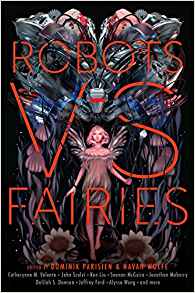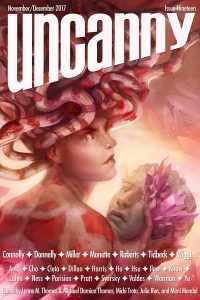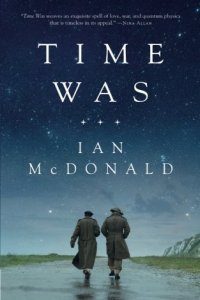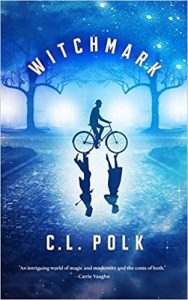These are the days of miracle and wonder, don’t cry baby, don’t cry; or (mostly) short fiction that I read in 2018, by Jonathan Strahan

The way we read fiction is changing. We’ve been told this repeatedly. Where once we had a single medium – ink on paper – to deliver new stories to us and only a few ways – face-to-face discussion, mail, reviews etc. – to discuss them, now we have many. Print is not dead; digital is not king. Instead, we read the way we like and when we like: in printed books and magazines; on e-readers, laptops, and phones. We have removed or reduced many of the barriers to publication that stood for generations by making it physically and financially easier to find, edit, print, and distribute books, magazines, or whatever. And we are reaping the whirlwind.
The gift of the whirlwind is that the voices of diverse populations of writers – from English-speaking countries and elsewhere – are being heard, discussed, and embraced by our genre in ways they were not before. This is an unalloyed good, and as the work of more and more people who were either deliberately silenced or simply discouraged from expressing themselves is read and recognized as a vital part of our genre, we all win. Our culture, our fiction, our genre is immeasurably enriched and, hopefully, so too are the lives of readers who get to see themselves in a way that they have not before, or perhaps, get to see and understand others as they have not done in the past.
 This is clearly in evidence in the best short fiction of 2018. Whether you look to magazines like Fiyah, Fireside, or Azimuth, which are fairly new, or read well-established magazines like Asimov’s, Clarkesworld, or Tor.com; whether it’s work from novella publishers like Tor.com Publishing, Subterranean, Tachyon, or PS Publishing; or stand-out anthologies like Robots vs Fairies, The Book of Magic, A Thousand Beginnings and Endings, or The Best Asian Speculative Fiction (brand new work, despite the title), the best fiction was as likely to come from newer writers like P. Djèlí Clark, Brooke Bolander, Alix E. Harrow, LaShawn M. Wanak, G.V. Anderson, S.L. Huang, and S. Qiouyi Lu; writers still in the early stages of what are shaping up to be major careers like Aliette de Bodard, Kelly Robson, Yoon Ha Lee, Sarah Pinsker, Theodora Goss, and Isabel Yap; or those who are experiencing an unexpected rejuvenation of their careers like Martha Wells; as it was to come from established names like Jeffrey Ford, Andy Duncan, John Crowley, Stephen King, Elizabeth Bear, or Greg Egan, all of whom had strong years in 2018.
This is clearly in evidence in the best short fiction of 2018. Whether you look to magazines like Fiyah, Fireside, or Azimuth, which are fairly new, or read well-established magazines like Asimov’s, Clarkesworld, or Tor.com; whether it’s work from novella publishers like Tor.com Publishing, Subterranean, Tachyon, or PS Publishing; or stand-out anthologies like Robots vs Fairies, The Book of Magic, A Thousand Beginnings and Endings, or The Best Asian Speculative Fiction (brand new work, despite the title), the best fiction was as likely to come from newer writers like P. Djèlí Clark, Brooke Bolander, Alix E. Harrow, LaShawn M. Wanak, G.V. Anderson, S.L. Huang, and S. Qiouyi Lu; writers still in the early stages of what are shaping up to be major careers like Aliette de Bodard, Kelly Robson, Yoon Ha Lee, Sarah Pinsker, Theodora Goss, and Isabel Yap; or those who are experiencing an unexpected rejuvenation of their careers like Martha Wells; as it was to come from established names like Jeffrey Ford, Andy Duncan, John Crowley, Stephen King, Elizabeth Bear, or Greg Egan, all of whom had strong years in 2018.
So where should you have been looking for great short fiction in 2018, to get the best bang for your buck? Simply in dollar terms, the easiest path was to read online, where a lot of strong work was published in the last twelve months. Tor.com remained a standout publisher of short fiction, both at novella-length in book form (which I’ll deal with elsewhere) and on its website. By my estimation, Tor.com published fewer original stories in 2018 than it had in 2017, but the stories it did publish were of the first rank, with strong work from Tina Connolly, Dale Bailey, Greg Egan, Kathleen Jennings, Lavie Tidhar, and others. I was most impressed with Rich Larson’s futuristic murder mystery, “Meat and Salt and Sparks”, which featured an uplifted chimpanzee and its human partner; Daryl Gregory’s astonishing near future tale of biological invasion “Nine Days on Planet Earth”; Kirstyn McDermott’s powerful recasting of Snow White, “Triquetra”; and James Patrick Kelly’s fine space opera, “Grace’s Family”.
 After Tor.com, Clarkesworld was easily your next best bet. Over twelve years and 146 issues, Neil Clarke and his team have established it as one of the top three venues for short fiction in the field, and its focus on translated fiction is invaluable. This year they published standout work by Bao Shu, Carolyn Ives Gilman, Rich Larson, Kelly Robson, Alan Bao, and others. My personal favorites were Simone Heller’s far future tale of a humanity struggling in the ruins, “When We Were Starless”, Robson’s “A Study in Oils”, Juliette Wade’s “The Persistence of Blood”, and Gilman’s novella, “Umbernight”. I don’t think it was quite Clarkesworld’s best year, but it was a strong one.
After Tor.com, Clarkesworld was easily your next best bet. Over twelve years and 146 issues, Neil Clarke and his team have established it as one of the top three venues for short fiction in the field, and its focus on translated fiction is invaluable. This year they published standout work by Bao Shu, Carolyn Ives Gilman, Rich Larson, Kelly Robson, Alan Bao, and others. My personal favorites were Simone Heller’s far future tale of a humanity struggling in the ruins, “When We Were Starless”, Robson’s “A Study in Oils”, Juliette Wade’s “The Persistence of Blood”, and Gilman’s novella, “Umbernight”. I don’t think it was quite Clarkesworld’s best year, but it was a strong one.
Scott H. Andrews’s Beneath Ceaseless Skies celebrated its 10th Anniversary this year, has developed into one of our best short fiction magazines, and deserves more credit for that than it typically gets. This year it featured top-notch work from Chris Willrich, Yoon Ha Lee, Bonnie Jo Stufflebeam, Sarah Pinsker, K.J. Parker, and others. Lee’s “The Starship and the Temple Cat”, Stufflebeam’s “The Crow Knight”, Pinsker’s “Do As I Do, Sing As I Sing”, and Parker’s “The Thought That Counts” were all highlights.
If Tor.com, Clarkesworld, and BCS were the frontrunners in 2018, the others weren’t far behind. John Joseph Adams’s Lightspeed had a good year, publishing some outstanding science fiction and fantasy by regulars and newcomers alike. Highlights included Theodora Goss’s trip to Wonderland, “Queen Lily”, Sarah Pinsker’s dark fantasy of magic and decay, “The Court Magician”, Maria Dahvana Headley’s equally dark “You Pretend Like You Never Met Me, and I’ll Pretend Like I Never Met You”, and Ken Liu’s “Cosmic Spring”. I’d be surprised if these and others don’t feature on awards ballots during 2019.
 The other major online fiction source is Lynne M. Thomas and Michael Damian Thomas’s Uncanny Magazine. The newest of the major magazines, it has, in just over two dozen issues, become a reliable source of great work, often on the borders of science fiction and fantasy. This year’s highlights included Kelly Robson’s “What Gentlewomen Dare”, Naomi Novik’s “Blessings”, T. Kingfisher’s “The Rose MacGregor Drinking and Admiration Society”, and Arkady Martine’s “The Hydraulic Emperor”, along with strong work from Sarah Pinsker, Nisi Shawl, and S.B. Divya.
The other major online fiction source is Lynne M. Thomas and Michael Damian Thomas’s Uncanny Magazine. The newest of the major magazines, it has, in just over two dozen issues, become a reliable source of great work, often on the borders of science fiction and fantasy. This year’s highlights included Kelly Robson’s “What Gentlewomen Dare”, Naomi Novik’s “Blessings”, T. Kingfisher’s “The Rose MacGregor Drinking and Admiration Society”, and Arkady Martine’s “The Hydraulic Emperor”, along with strong work from Sarah Pinsker, Nisi Shawl, and S.B. Divya.
Jason Sizemore’s Apex Magazine published two of the year’s best fantasies. Alix E. Harrow’s moving bibliofantasy “A Witch’s Guide to Escape: A Practical Compendium of Portal Fantasies” and Naomi Kritzer’s “Field Biology of the Wee Fairies” were delightful, but in a strong year Apex also featured good work by Adam Shannon, James Beamon, Nisi Shawl, and others.
Fireside Magazine is a comparatively new magazine that had a great year in 2018, publishing one of the year’s best stories, P. Djèlí Clark’s “The Secret Lives of the Nine Negro Teeth of George Washington”, alongside strong work from Sarah Gailey, Innocent Chizaram Ilo, Marissa Lingen, and others. And although I sometimes find myself not enjoying work published by Strange Horizons, Isabel Yap’s “Asphalt, River, Mother, Child” was a major piece from a powerful new voice. Also excellent were work from Celeste Rita Baker, Ada Hoffman, Eleanna Castroianni, and Octavia Cade. Definitely a recommended venue.
There were also a few one-shot and special projects that published great short fiction online. The best was Slate’s Future Tense, which included notable work from Carmen Maria Machado, Nnedi Okorafor, Charlie Jane Anders, Maureen McHugh, and others. Focused on discussing how the world is changing and can be improved, it was essential during the year. Wired also published a special fiction issue in late December. Designated as a January 2019 issue, it featured important work from Charlie Jane Anders, Nisi Shawl, Ken Liu, Martha Wells, and others.
Certainly, the three major print magazines all had good years, all were well worth the money (I subscribe to all three), all repaid the effort to seek out, and all published work that deserved a bit more of the limelight than it might otherwise be getting.
Sheila Williams has been editing Asimov’s Science Fiction for 14 years, has carried it through challenging times, and it has flourished under her stewardship. Not only does it seem to be a healthy business (something we should value), but it publishes superior work by both new and established writers. Easily the best story in Asimov’s this year was S. Qiouyi Lu’s deeply moving “Mother Tongues”, which spoke convincingly and powerfully to the price parents pay to advance the lives of their children. Also of merit were Greg Egan’s novella “3-adica”, Alexandra Renwick’s “Because Reasons”, Linda Nagata’s “Theories of Light”, and Robert Reed’s “Love Songs for the Very Awful”. Recommended.
Historically I’ve found Asimov’s stablemate, Analog Science Fiction and Fact, a bit less to my taste, though it has always included enough work that resonates for me to keep me reading. The most interesting story of the year from Trevor Quachri and team was Andy Duncan’s engaging and provocative “New Frontiers of the Mind”, which posits a counterfactual involving Astounding editor John W. Campbell, J.B. Rhine, and psychic experiments. Fascinating stuff, especially in the same year Alec Nevala-Lee published a major book on Astounding, Campbell, and crew (which is highly recommended). Nevala-Lee also published the best hard SF story in Analog this year, “The Spires”, though there was also strong work from Adam-Troy Castro, Rich Larson, Nick Wolven, and others.
The Magazine of Fantasy & Science Fiction, once described to me as “The New Yorker of science fiction,” had a consistent year in 2018, with editor C.C. Finlay moving into his fourth year at the helm with a very “steady-as-she-goes” approach, and the best material in the magazine standing with the best of the year. Dale Bailey, who has been on something of a tear of late, produced the dark and disturbing”The Donner Party”, which I expect to see in every horror year’s best. Vandana Singh, who also published a major short story collection with Small Beer in 2018, had the darkly dystopian “Widdam” in the January issue. Also excellent were Nick Wolven’s “Galatea in Utopia”, G.V. Andersons’s “Down Where Sounds Comes Blunt”, L.X. Beckett’s novella “Freezing Rain, a Chance of Falling” and Robert Reed’s “An Equation of State”.
These three magazines – Asimov’s, Analog, and F&SF – were for many years dubbed “the big three”. While I don’t think that’s an accurate or useful description in 2018, they are all vital publications that strongly deserve your support and that stand as critically important parts of the short fiction scene. Andy Cox’s Interzone traditionally, and rightfully, has rounded out the list of major print magazines in the field for a while now. Once part of the cutting edge of the field, it has evolved into a beautifully designed and produced part of the SF/F mainstream. This year it featured strong work by Gregor Hartmann, Ryan Row, Samantha Murray, Abi Hynes, and Alexandra Renwick. Less readily available than the other print ‘zines mentioned here, it and its stablemate Black Static are well worth reading.
And finally, there’s Fiyah: Magazine of Black Speculative Fiction. Only eight issues old, it has become an important part of the SF/F field that I strongly recommend you chase down. This year it published three outstanding issues, including extraordinary work by Tade Thompson and LaShawn M. Wanak in the music-themed issue seven, and fine work by Julianna Goodman, Sheree Renée Thomas, and others.
 One of the major trends of recent years has been the publication of novellas as stand-alone books to significant acclaim and sales. That continued this year and seems only likely to grow, with major work from Martha Wells (three Murderbot stories!), a final Binti story from Nnedi Okorafor, and more Wayward Children stories from Seanan McGuire. The outstanding story from Tor.com Publishing, though, and one of my personal favorites of the year, was Kelly Robson’s remarkable Gods, Monsters and the Lucky Peach, a powerhouse novella filled with nuanced character, thoughtful speculation, and a devilish sense of humor as a team from the 23rd century travelled to the past to help save the future. I also was floored by Brooke Bolander’s novelette, The Only Harmless Great Thing, a devastating tale that combines the Radium Girls with the ancient wisdom of elephants. It shouldn’t work, but it does. Remarkable stuff. There’s a conflict of interest in my recommending Ian McDonald’s time-travel romance, Time Was, since I acquired and edited it, but it stands amongst his best work. Finally, one of the year’s strongest debuts was P. Djèlí Clark’s The Black God’s Drums, which has left me eagerly waiting for more, while JY Yang continued their critically acclaimed series of novellas with The Descent of Monsters.
One of the major trends of recent years has been the publication of novellas as stand-alone books to significant acclaim and sales. That continued this year and seems only likely to grow, with major work from Martha Wells (three Murderbot stories!), a final Binti story from Nnedi Okorafor, and more Wayward Children stories from Seanan McGuire. The outstanding story from Tor.com Publishing, though, and one of my personal favorites of the year, was Kelly Robson’s remarkable Gods, Monsters and the Lucky Peach, a powerhouse novella filled with nuanced character, thoughtful speculation, and a devilish sense of humor as a team from the 23rd century travelled to the past to help save the future. I also was floored by Brooke Bolander’s novelette, The Only Harmless Great Thing, a devastating tale that combines the Radium Girls with the ancient wisdom of elephants. It shouldn’t work, but it does. Remarkable stuff. There’s a conflict of interest in my recommending Ian McDonald’s time-travel romance, Time Was, since I acquired and edited it, but it stands amongst his best work. Finally, one of the year’s strongest debuts was P. Djèlí Clark’s The Black God’s Drums, which has left me eagerly waiting for more, while JY Yang continued their critically acclaimed series of novellas with The Descent of Monsters.
Subterranean Press also published several standout novellas, most notably Aliette de Bodard’s fabulous The Tea Master and the Detective and Greg Egan’s powerful Phoresis, both of which are strongly recommended. Tachyon published a typically rigorous and provocative hard SF novella from Peter Watts, The Freeze-Frame Revolution, and PS Publishing gave us Janeen Webb’s highly enjoyable The Dragon’s Child, among a number of strong offerings.
One of this risks with a year-in-review essay like this is you begin to find yourself running out of space to discuss everything you’d like to. Not unexpectedly, 2018 was a strong year for short story collections. This is inevitable, really, when you consider how much short fiction we see, but even so there were some wonderful books published. Andy Duncan’s first North American collection since 2000, An Agent of Utopia (Small Beer) mixed new, recent, and older material in a book that showcased why he is a treasure. N.K. Jemisin, who has dominated at novel length recently, delivered her debut collection, How Long ’til Black Future Month? (Orbit), which featured several of the year’s best stories along with older work and is an essential part of any reader’s bookshelf.
 Kelly Barnhill, who scooped up a World Fantasy Award for one of her novellas in 2016, published her debut collection, Dreadful Young Ladies and Other Stories (Algonquin), and it was a charming, delightful breath of fresh air. Catherynne M. Valente’s eighth collection, The Future is Blue (Subterranean), is also her best, and featured terrific work, including the title story. Subterranean also published The Father of Lies, the follow up to K.J. Parker’s Academic Exercises, which stands as one of the best fantasy collections of the year. There were many other worthwhile collections published. I loved Vandana Singh’s Ambiguity Machines and Other Stories (Small Beer), James Patrick Kelly’s The Promise of Space (Prime), Nana Kwame Adjei-Brenyah’s Friday Black (Mariner), and Priya Sharma’s debut All the Fabulous Beasts (Undertow).
Kelly Barnhill, who scooped up a World Fantasy Award for one of her novellas in 2016, published her debut collection, Dreadful Young Ladies and Other Stories (Algonquin), and it was a charming, delightful breath of fresh air. Catherynne M. Valente’s eighth collection, The Future is Blue (Subterranean), is also her best, and featured terrific work, including the title story. Subterranean also published The Father of Lies, the follow up to K.J. Parker’s Academic Exercises, which stands as one of the best fantasy collections of the year. There were many other worthwhile collections published. I loved Vandana Singh’s Ambiguity Machines and Other Stories (Small Beer), James Patrick Kelly’s The Promise of Space (Prime), Nana Kwame Adjei-Brenyah’s Friday Black (Mariner), and Priya Sharma’s debut All the Fabulous Beasts (Undertow).
Finally, I’d strongly recommend Caitlín R. Kiernan’s The Dinosaur Tourist (Subterranean). She has been producing strong and varied work for so long that it’s easy to take it for granted, but this is proof once again that she stands amongst the best short fiction writers we’ve seen.
And then there were anthologies. I have a conflict of interest here (as always) so I’m acknowledging that I edited Infinity’s End and moving on, I’d strongly recommend three original anthologies from 2018 as the very best of the year. Dominik Parisien & Navah Wolfe followed up their outstanding The Starlit Wood with a more playful book in Robots vs Fairies, which took the template of Zombies vs. Unicorns and used it to pit science fiction against fantasy with great success. There were no weak stories in the book, but the ones by Annalee Newitz, Catherynne M. Valente, Madeleine Ashby, Ken Liu, Lavie Tidhar, Jeffrey Ford, and Seanan McGuire all stood out. Ellen Oh & Elsie Chapman’s A Thousand Beginnings and Endings may just pip it at the post, though, for the title of the very best anthology of 2018 and the one I’ll be shocked not to see on awards ballots next year. Writers took tales from the folklore and mythology of East and South Asia and reinvented and refreshed them. While I especially loved the stories from Alyssa Wong, Aliette de Bodard, and Roshani Chokshi, all were worth reading.
The saddest event in short fiction in 2018 for me was the unexpected death of my friend and colleague, Gardner Dozois, whose writing and editing stand as towering achievements, and who will be sorely missed. In recent years, Gardner had edited a string of bestselling cross-genre anthologies with George R.R. Martin, and was in the middle of editing a set of fantasy anthologies to follow 2017’s The Book of Swords. 2018 saw the publication of The Book of Magic, which will be his final original anthology and, unsurprisingly, it is of the highest quality featuring wonderful core fantasy stories by John Crowley, Andy Duncan, Garth Nix, K.J. Parker, Eleanor Arnason, Megan Lindholm, Scott Lynch, Liz Williams, and Elizabeth Bear. It’s a fitting end to a remarkable career.
There were other strong anthologies published in 2018, like Irene Gallo’s Worlds Seen in Passing: Ten Years of Tor.com Short Fiction, Susan Law & Lucas K. Forest’s Shades Within Us, Wade Roush’s Twelve Tomorrows, Rivqa Rafael & Tansy Rayner Roberts’s Mother of Invention, and Lisa Yaszek’s The Future is Female, all of which are recommended, as are many which appear on our main list, but I’ve lingered too long and can really only suggest you take time to seek them out for yourself.
 I read very few novels in 2018. As you can imagine, short fiction dominated my reading and I have very little perspective to offer. Still, I can’t let this moment go past without mentioning Sam J. Miller’s sophomore effort. Blackfish City, was the best book I read in 2018 and did everything you could ask of science fiction at this point in time, being timely, thoughtful, moving, and extremely entertaining. I exhort you to buy it, read it, and put it on every awards ballot you can. I’d also recommend C.L. Polk’s debut fantasy, Witchmark, which is delightful.
I read very few novels in 2018. As you can imagine, short fiction dominated my reading and I have very little perspective to offer. Still, I can’t let this moment go past without mentioning Sam J. Miller’s sophomore effort. Blackfish City, was the best book I read in 2018 and did everything you could ask of science fiction at this point in time, being timely, thoughtful, moving, and extremely entertaining. I exhort you to buy it, read it, and put it on every awards ballot you can. I’d also recommend C.L. Polk’s debut fantasy, Witchmark, which is delightful.
I’d originally intended to open this year in review by saying that the short fiction scene, structurally, strikes me as being unstable and difficult to sustain without real change. It’s not unlike the Yellowstone super volcano. It looks peaceful from a distance; the flora and fauna nearby are flourishing, but you just never know when it’s going to blow (though it certainly will one day). It’s slightly melodramatic, but there’s truth to that observation. The business of publishing short fiction is in a rather precarious state. It needs new readers, new markets, and it needs readers to financially support the work they value. If I can persuade you to do just one thing (well, one or two given the recommendations above), I’d ask you to subscribe to a magazine where you can, pay for a story if it’s possible, buy an anthology or collection, support the publishers and writers who are giving us all such wonderful work. If you can’t, you shouldn’t feel you should. We live in a shared culture and creators want their work to be accessible and enjoyed – but if you can then please consider it. And if you can’t, recommend short work to others. There is, after all, a lot of good reading out there, and none of it comes free.
And we’re done. A good year, a strong year, a precarious year, but one where almost everyone made it to the end. Let’s see what 2019 brings!
This and more like it in the February 2019 issue of Locus.
 While you are here, please take a moment to support Locus with a one-time or recurring donation. We rely on reader donations to keep the magazine and site going, and would like to keep the site paywall free, but WE NEED YOUR FINANCIAL SUPPORT to continue quality coverage of the science fiction and fantasy field.
While you are here, please take a moment to support Locus with a one-time or recurring donation. We rely on reader donations to keep the magazine and site going, and would like to keep the site paywall free, but WE NEED YOUR FINANCIAL SUPPORT to continue quality coverage of the science fiction and fantasy field.








